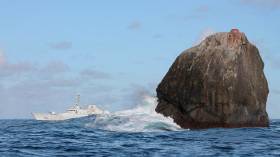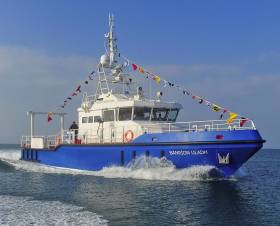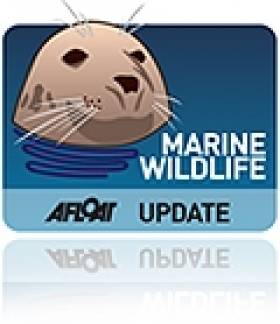Displaying items by tag: politics
Department of Sport Reportedly Kept in Dark About Cork Harbour America’s Cup Plans for Three Months
It's emerged that Minister of Sport Catherine Martin was not told about proposals to host the America's Cup in Cork Harbour for three months.
According to Saturday's Irish Times, an unpublished Government report also reveals that ministers were warned the plans were "overly optimistic and laden with risk".
Last month the bid was officially withdrawn hours before Barcelona were selected as the preferred bidders to host the next edition of the Auld Mug.
Foreign Affairs Minister and Cork TD Simon Coveney confirmed last summer that a bid had been in the works since January 2021. But it's now emerged that the Department of Sport was not informed of the plans until three momnths later.
Subsequent reports and discussions revealed concerns with the event contract and the "very significant costs" involved in staging the event, including related capital projects in Cork Haerbour and environs.
The Irish Times has much more on the story HERE.
Fine Gael MEP Defends Vote Against Measure To Enhance Mediterranean Rescue Missions
Fine Gael MEP Maria Walsh has defended her decision to vote against a resolution in the European Parliament to enhance rescue missions for migrants in the Mediterranean.
The vote in Strasbourg yesterday (Thursday 24 October) lost by two. Every Fine Gael MEP — Walsh, Frances Fitzgerald, Sean Kelly and Mairéad McGuinness — voted against the resolution.
There were also four votes not recorded, from independent Clare Daly, Billy Kelleher (Fianna Fáil), Dianne Dodds (DUP) and Naomi Long (Alliance).
The Fine Gael MEPs have been criticised for their stance against the resolution that called on member states to “step up their efforts” and “enhance proactive search and rescue operations” in the Mediterranean, a signifiant and perilous crossing point for people from Africa and Asia seeking asylum in Europe.
The vote result was applauded in the chamber among the far-right block of European parliamentarians, a response condemned among others by Green Party MEP Grace O’Sullivan who voted for the resolution.
Speaking on behalf of her fellow party MEPs, Walsh said their decision was based on issues with ‘sharing intelligence’.
“We want to save lives and fight human traffickers and to do that, we need a coherent, comprehensive and long-term EU response to search and rescue in the Mediterranean,” she said after the vote.
“In the short-term, the EU and member states must allocate more resources to Search and Rescue and increase missions to save more lives. We also need to urgently step up the fight against the organised criminals and human traffickers who profit on the vulnerable.
“The resolution rejected by the European Parliament today does the opposite by calling for Frontex, the European border and coastguard agency, to share intelligence about its operational activities with every boat in the Mediterranean.
“That would endanger more lives by facilitating, instead of dismantling, the business models of smugglers and human traffickers. We could not support that.”
Walsh, who sits on the European Parliament’s Civil Liberties Committee, said “we can do so much better” than the failed resolution “which plays into hands of people smugglers and lacks workable solutions”.
Update Friday 25 October: this article has been corrected to note that the absent votes of four Irish MEPs were not recorded.
Authorities in Ireland have rejected Scotland’s threat of “enforcement action” against Irish trawlers in the waters around Rockall, as the two states fall into a spat over fishing rights in the North Atlantic territory.
The Irish Times reports on a formal letter received yesterday from Scottish external affairs minister Fiona Hyslop, declaring Scotland’s intention to defend its interests against “illegal activity” within 12 miles of the uninhabitable islet.
Rockall, which lies 300km west of Scotland and some 430km north-west of Ireland, is claimed by the United Kingdom — but Ireland does not recognise UK sovereignty over the territory.
In their response, Marine Minister Michael Creed and Tánaiste and Foreign Affairs Minister maintained the position of the Irish Government that “the waters around Rockall form part of Union waters under the Common Fisheries Policy, to which the principle of equal access for the vessels of all EU Member States applies”.
Their statement added: “Irish vessels have operated unhindered in the Rockall zone for many decades fishing haddock, squid and other species.”
The ministers noted that the issue of access to Rockall’s fishing grounds first arouse in 2017 following the Brexit referendum.
“The Tánaiste and I have worked very closely to avoid a situation whereby Irish fishing vessels who have been and continue to fish for haddock, squid and other species in the 12-mile area around Rockall, are under the unwarranted threat of ‘enforcement action’ by the Scottish government,” Minister Creed said yesterday (Friday 7 June).
“However, following this sustained unilateral action by them, I have no option but to put our fishing industry on notice of the stated intention of the Scottish government.”
The Tánaiste said: “The longstanding position of the Irish Government is that Irish vessels are entitled to access to Rockall waters. We have never recognised UK sovereignty over Rockall and accordingly we have not recognised a territorial sea around it either.
“We have tried to work positively with the Scottish authorities and to deal with sensitive issues that flow from it in a spirit of kinship and collaboration. We very much regret that matters have reached this point and intend to do everything possible to achieve a satisfactory resolution.”
Minister Creed has met the fishing industry representatives to explain the situation and to advise them of the threat of enforcement action by the Scottish authorities.
“I am very disappointed to have had to make them aware of the risk,” he said, adding that they are “justifiably concerned at this action being taken by a fellow member states where our industries are closely connected”.
Storm Over Name Change For NI Fisheries Patrol Vessel
#BanríonUladh - A Northern Irish minister has sailed into stormy waters after rechristening a fisheries protection vessel from its Irish name to its English translation, as the Belfast Telegraph reports.
Banrion Uladh — which patrols the Irish Sea between Lough Foyle and Anglesey in North Wales — is now Queen of Ulster after the change by Agriculture Minister Michelle McIlveen, whose DUP expressed upset over the original naming of the vessel by then minister Michelle Gildernew of Sinn Féin in 2010.
The renaming, which was carried out during scheduled repairs, is cited as part of a move by Minister McIlveen’s department to a single-language policy in the new Department of Agriculture, Environment and Rural Affairs.
The Belfast Telegraph has more on the story HERE.
Northern Ireland Marine Bill Discussed at Special Workshop
#MARINE WILDLIFE - A meeting of the Northern Ireland Marine Task Force (NIMTF) last week brought together interests from across the spectrum to discuss the new Marine Bill and ensure it will "deliver for all sea users".
The workshop at Castle Espie on Strangford Lough last Thursday 22 March saw politicians sit down with environmentalists, fishermen and wind farm developers, and engage with those responsible for drafting the proposed legislation.
According to a statement from the Ulster Wildlife Trust, which is a member of the NIMTF, the bill "provides for the creation of a network of marine protected areas to protect marine wildlife" as well as a roadmap for a more joined-up approach to the North's marine resources.
NIMTF spokesperson Ricky Devlin said: "We now need to ensure that [the bill] addresses the full range of environmental, recreational and commercial interests such as fishing, diving, electricity generation and aquaculture."
A full report of the meeting will be available shortly from www.nimtf.org

































































